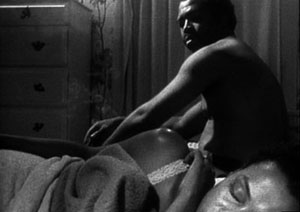Unemployment and the resulting breakdown of the American family—all central themes explored in Billy Woodberry’s Bless Their Little Hearts. Although made in 1984, the film feels eerily familiar and the conflicts within it appear strikingly current. According to the Bureau of Labor Statistics, more than 25.8 million (16%) of 154 million Americans are un- (or under-) employed. It’s safe to assume that as we sat in the theater watching the wife in the movie, Andais Banks (Kaycee Moore), argue with her husband, Charlie Banks (Nate Hardman) over money and survival in their poverty-stricken 1980s Los Angeles neighborhood, some family today, at this very moment, was likely feuding over the same issues. Deepening the relevance in this movie, were the intricate nuances of the Black American family, whose struggles were often intensified due to cultural barriers and decelerated progress since the days of slavery.

Slavery was unarguably the first chapter in the breakdown of the Black family. Some argue that this breakdown was a result of the Black man’s emasculation during this time. Outlawing the marriage of slaves, the rape of slave women, even with their mates’ knowledge, the sale of slave children and “spouses” to other plantations were the first notable steps in this emasculation. These occurrences often forced the Black woman to become the head of her own household, not to mention a major caretaker in households of the White families for whom she worked. As a result, the Black man often did not have the opportunity to take his rightful place as the “man” in the family, which like a cancer, has possibly become engrained in the culture, negatively affecting families since that time.
One of the most common questions in the dialogue between Black and White people, and even within the Black community, is at what point do the effects of slavery end and today’s accountability begins? Is it ever really possible to draw that line? That’s never an easy thing to answer. It’s hard to say whether Charlie Banks tried hard enough to find a job, or whether it would have been easier for him to do so had he been White. It’s equally as difficult to know whether his inability to get a job had to do with systematic racism, the job climate at the time or just plain bad luck. Those were the underlying questions in Bless Their Little Hearts, and are the questions that many African Americans ask themselves even today. We may never know the answers, but with Bless Their Little Hearts, director Billy Woodberry and writer Charles Burnett drill to the core of a family and expose universal themes we still connect to today – the idea that every father has a dream for his family. And no matter what gets in the way, external factors, or internal ones, we all can connect to that dream and to the disappointment caused when that dream gets lost.
—Felischa Marye






 Mobile Navigation
Mobile Navigation


Comments